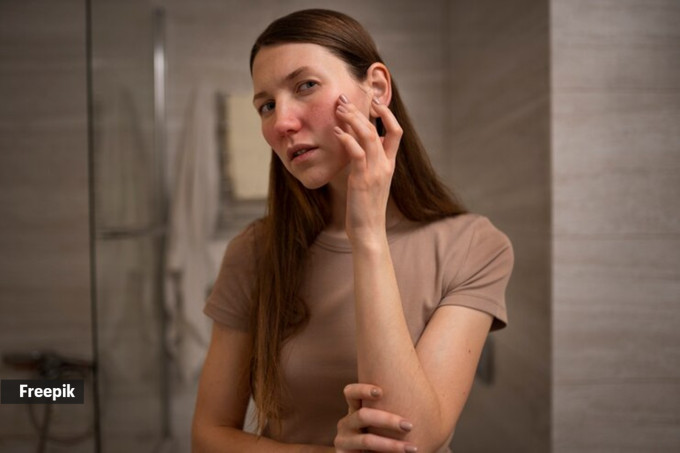Uorfi Javed reveals reason behind her swollen face: ‘Fillers nahi hai guys…’
Actor and content creator Uorfi Javed has addressed speculation surrounding her appearance, specifically the swelling that drew considerable attention online.
Lok Sabha Election Results 2024
Contrary to rumours suggesting the involvement of cosmetic procedures such as fillers and botox, Javed has attributed the swelling to allergies instead.

Sharing a picture of her swollen face on Instagram, where she wrote, “Fillers nahi hai guys, allergies hai (It’s not fillers guys, it’s because of allergies). Immunotherapy chalu hai (I am getting immunotherapy) but if you next see me with a swollen face. Just know, I’m going through one of those bad allergy days. I’ve not gotten anything done except of course my usual fillers and Botox which I’ve been getting since I was 18 (sic).”
View this post on Instagram
A post shared by Uorfi (@urf7i)
“Uorfi Javed’s experience with chronic facial swelling highlights the importance of differentiating between allergic reactions and side effects from cosmetic procedures,” agrees Dr Gunasekar Vuppalapati, senior consultant aesthetic, Reconstructive and Plastic Surgery at GVG Invivo Hospital.
He continues, “Injectable substances that contain hyaluronic acid, collagen add volume to targeted areas, plumping wrinkles or enhancing facial features. Botulinum toxin (botox) injections relax targeted facial muscles, reducing the appearance of wrinkles. Both fillers and botox can trigger allergic reactions, though uncommon.”
Symptoms and causes of severe facial allergies
Facial allergies trigger an inflammatory response mediated by histamine release from mast cells, he says. This leads to a cascade of events causing:
Edema (swelling): Increased blood vessel permeability allows fluid to leak into tissues, causing puffiness in the eyes, lips, cheeks, and forehead.
Pruritus (itching): Histamine binds to receptors on sensory neurons, activating the itch sensation.
Rhinitis (runny/stuffy nose): Allergens stimulate goblet cells in the nasal lining, leading to mucus production and congestion.
Conjunctivitis (red, watery eyes): Mast cells in the conjunctiva (eye lining) release histamine, causing redness, itching, and tearing.
(Potential) Anaphylaxis: In severe cases, widespread inflammation can lead to difficulty breathing, a life-threatening medical emergency.
There are several reasons why someone might suffer from these symptoms. These include:
Food Allergies: Food proteins trigger IgE antibody production. Upon re-exposure, IgE binds to mast cells, causing histamine release and allergic reaction.
Medication Allergies: Certain medications (e.g., penicillin) can bind to immune proteins, activating the immune system and triggering facial swelling.
Insect Stings: Bee venom contains various components that trigger histamine release and localised inflammation, leading to facial swelling.
Inhalant Allergens: Airborne allergens like pollen bind to mast cells in the nasal passages and conjunctiva, causing facial swelling around the eyes.
How to differentiate between swelling caused by allergies and side effects from cosmetic procedures?
Allergic swelling typically occurs within minutes to hours of exposure, informs Dr Vuppalapati. It involves intense itching due to histamine-mediated activation of itch receptors. A person might show additional symptoms like runny nose, wheezing, or nausea, indicating a broader systemic reaction.
 Certain medications (e.g., penicillin) can bind to immune proteins, activating the immune system and triggering facial swelling. (Source: Freepik)
Certain medications (e.g., penicillin) can bind to immune proteins, activating the immune system and triggering facial swelling. (Source: Freepik)
In case of swelling due to cosmetic procedures, he elaborates, the symptoms may develop gradually over 24-48 hours after the procedure, as the body’s inflammatory response to the filler or botox injection takes place.
However, unlike in the case of allergic reactions, procedural swelling usually doesn’t cause itching unless there’s an allergic reaction to the filler or Botox components. “Typically, it won’t cause these additional symptoms unless there’s a severe allergic reaction or infection at the injection site,” Dr Vuppalapati says.
Treatment options
Dr Vuppalapati mentions the following treatment options for people who are suffering from chronic face swelling:
Identifying the Trigger: The first step is pinpointing the allergen causing the swelling. This often involves allergy testing by a doctor, which can identify specific food, medication, or inhalant allergens a person is sensitive to.
Avoiding Triggers: Once identified, strict avoidance of the allergy trigger is essential to prevent future reactions.
Antihistamines: These medications block histamine receptors, reducing swelling, itching, and other allergy symptoms.
Corticosteroids: In severe cases, oral or topical corticosteroids may be prescribed to reduce inflammation.
Allergy Shots (Immunotherapy): In some cases, allergy shots can be used for long-term management. These gradually expose the body to increasing amounts of the allergen, aiming to desensitise the immune system and reduce future reactions.
Disclaimer: The copyright of this article belongs to the original author. Reposting this article is solely for the purpose of information dissemination and does not constitute any investment advice. If there is any infringement, please contact us immediately. We will make corrections or deletions as necessary. Thank you.
